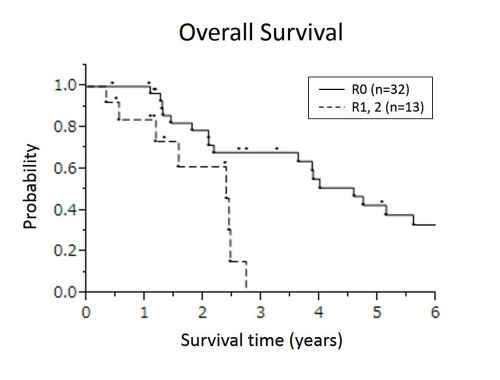|
Back to 2015 Annual Meeting Program
A Retrospective Study of 45 Patients Who Underwent Surgical Treatment for Local Recurrence of Rectal Cancer
Shinobu Ohnuma, Hideaki Karasawa*, Kazuhiro Watanabe, Munenori Nagao, Tomoya Abe, Takeshi Naitoh, Michiaki Unno
Department of Surgery, Tohoku University Hospital, Sendai, Japan
Background/purpose: The preoperative chemoradiotherapy and total mesorectal excision for advanced rectal cancer has decreased the rate of local recurrence of rectal cancer (LRRC). However, once LRRC has occurred, it is difficult to cure the patients with LRRC. Optimal therapy to treat LRRC remains controversial. Therefore, we retrospectively analyzed patients who underwent surgical treatment for LRRC, to evaluate the perioperative outcome and the prognosis.
Methods: Forty-five patients (male-female ratio, 25:20), who underwent surgical treatment for LRRC in a single institution between 1990 and 2014, were clinicopathologically analyzed.
Results: The mean age at surgical treatment for LRRC was 60 years old (range 36-87). Thirty-four patients (76%) were diagnosed as LRRC within three years after surgery for the primary tumor. Total pelvic exenteration, abdominoperineal resection or low anterior resection, and simple tumor excision were performed in 7, 27, and 11 patients, respectively. The median operative time, blood loss and hospital stay were 530 min, 2213 ml and 53 days, respectively. Out of 45 patients, 32 patients (71%) had curative (R0) resection and 13 patients (29%) had non-curative resection. The complications, such as intrapelvic abscess, urinary tract dysfunction, wound infection, and intestinal obstruction, were observed in 35 patients (75%) after surgical treatment for LRRC. There was no surgery-related death. Three-year survival rate of all 45 patients and 35 patients with R0 resection were 53% and 73%, respectively. No three-year survivors were observed in the patients with non-curative resection.
Conclusions: Although surgical treatment for LRRC is highly invasive, curative (R0) resection improves the outcome of the patients with LRRC.

Overall survival curves of LRRC patients. Solid line summarized patients with curative resection and dashed line showed patients with non-curative resection.
Back to 2015 Annual Meeting Program
|


